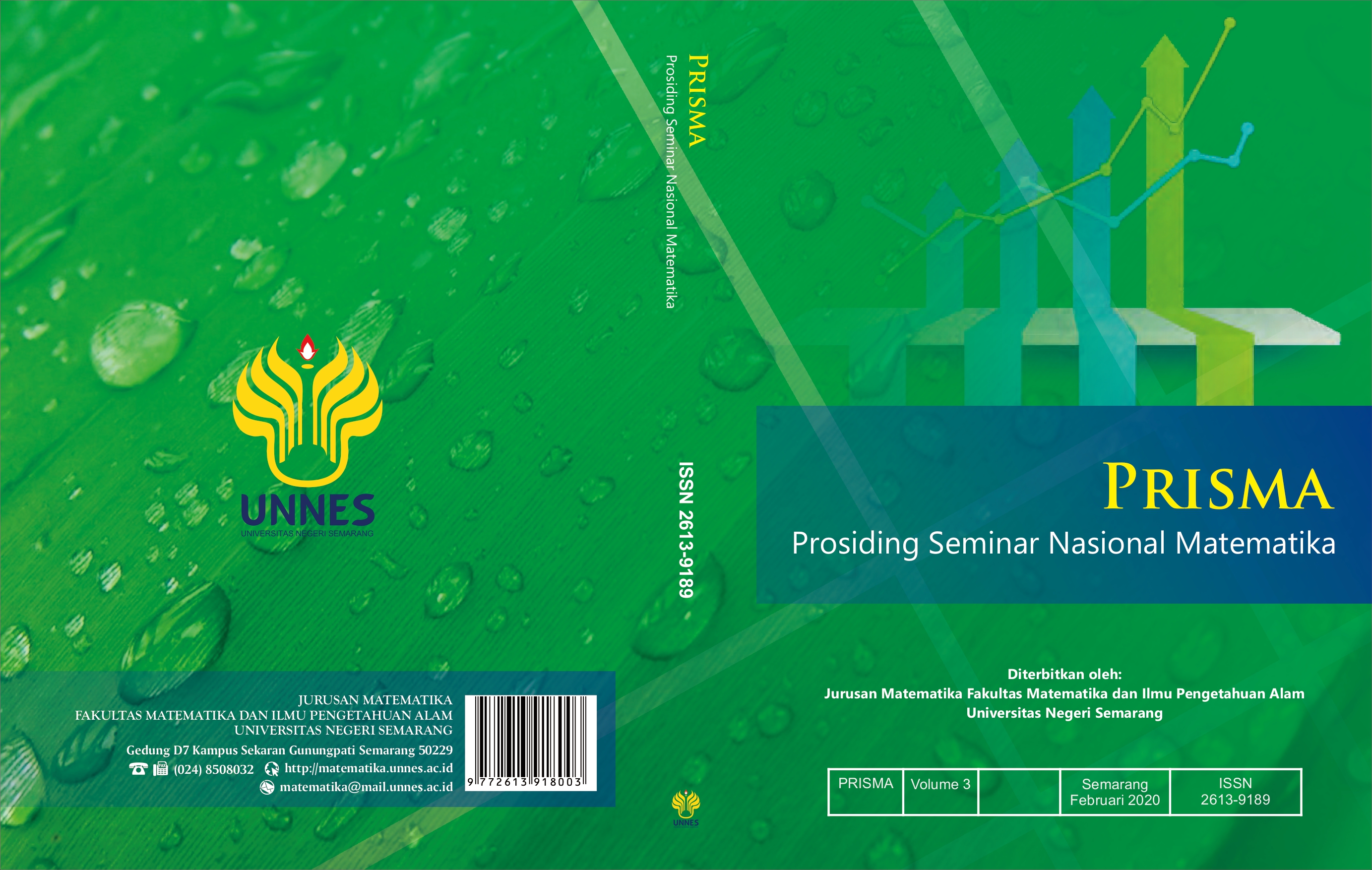Kemampuan Pemecahan Masalah dengan Tutor Feedback
Main Article Content
Abstract
Tujuan penelitian ini adalah mendeskripsikan kemampuan pemecahan masalah dengan Tutor Feedback siswa SMA Islam Pekalongan. Analisis data dilakukan secara deskriptif menunjukkan bahwa kemampuan pemecahan masalah siswa masih rendah dikarenakan kurangnya umpan balik siswa dalam pembelajaran. Hasil kajian sebagai berikut Pemecahan masalah adalah hal yang sangat penting dalam manusia, setiap kehidupan memiliki masalah yang harus diselesaikan dengan baik dan tepat. Tutor Feedback adalah suatu informasi dalam bentuk komunikasi yang dua arah yang sifatnya menghakimi dengan tujuan untuk menyediakan sebuah informasi tentang suatu kualitas pekerjaan siswa atau sebagai panduan untuk meningkatkan kualitas pekerjaan siswa melalui tutor (guru).
Article Details
How to Cite
Aminudin, M., Kartono, K., & Masrukan, M. (2020). Kemampuan Pemecahan Masalah dengan Tutor Feedback. PRISMA, Prosiding Seminar Nasional Matematika, 3, 402-404. Retrieved from https://journal.unnes.ac.id/sju/prisma/article/view/37629
Section
Articles
References
Anggraini, W., Hudiono, B., & Hamdani. (2015). Pemberian Umpan Balik (feedback) terhadap Hasil Beelajar dan Self-Efficacy Matematis Siswa Kelas VII SMP. Jurnal Pendidikan dan Pembelajaran, 4(9),1-13
Daneshamooz., Saced., Alamolhodaci, H., & Darvishian, S. (2012). “Experimental Research bout Effect of Mathematics Anxiety, Working Memory Capacity on Students†Mathematical Performance with Three Different Types of Learning Methodsâ€. ARPN Journal of Science and Technology, 2(4): 313-321
Depdiknas. (2006). Permendiknas Nomor 22 tahun 2006. Tentang Standar Isi. Jakarta: Depdiknas
Hendriana Heris,dkk. 2018. Hard Skillls dan Soft Skills Matematika Siswa. Bandung. Penerbit PT Refika Aditama.
NCTM. (2000).Principles and Standards for School Mathematics. Reston, VA: Author
OECD. (2015. 2015 PISA Result In Focus
Saad, N.S & Ghani, A. S. 2008. Implementing Kolb’s Learning Style into Online Distance Education. International Journal of Technology in Teaching and Learning, 1, 45-54.
Smits, M., Sluijsmans, D., & Jochems, W. (2009). The Effects of a Competency-Oriented Learning Environment and Tutor Feedback on Students reflection Skill. Assesment & Evaluation in Higher Education, 34(5), 491-498.
Tang, J., & Harrison, C. (2011). Investigating University Tutor Perceptions of Assesment Feedback: Three Types of Tutor Beliefs. Assesments & Evaluation in Higher Education, 36(5), 583-604.
Ulya, H., kartono., & Retnoningsih, A. 2014.“Analysis of Mathemathics Problem Solving Ability of Junior High School Students Viewed from Students Cognitive Styleâ€. International Journal of Education and Research, 2(10): 577-582.
Zevenbergen, R., Dole, S. & Wright, R.J. 2004. Theaching Mathemathics in Primary Schools. Australia
Wilson, P.1993. Research Ideas for The Classroom High School Mathematics (Mathematical Symbols and Representations). Macmillan Publishing Company.
Daneshamooz., Saced., Alamolhodaci, H., & Darvishian, S. (2012). “Experimental Research bout Effect of Mathematics Anxiety, Working Memory Capacity on Students†Mathematical Performance with Three Different Types of Learning Methodsâ€. ARPN Journal of Science and Technology, 2(4): 313-321
Depdiknas. (2006). Permendiknas Nomor 22 tahun 2006. Tentang Standar Isi. Jakarta: Depdiknas
Hendriana Heris,dkk. 2018. Hard Skillls dan Soft Skills Matematika Siswa. Bandung. Penerbit PT Refika Aditama.
NCTM. (2000).Principles and Standards for School Mathematics. Reston, VA: Author
OECD. (2015. 2015 PISA Result In Focus
Saad, N.S & Ghani, A. S. 2008. Implementing Kolb’s Learning Style into Online Distance Education. International Journal of Technology in Teaching and Learning, 1, 45-54.
Smits, M., Sluijsmans, D., & Jochems, W. (2009). The Effects of a Competency-Oriented Learning Environment and Tutor Feedback on Students reflection Skill. Assesment & Evaluation in Higher Education, 34(5), 491-498.
Tang, J., & Harrison, C. (2011). Investigating University Tutor Perceptions of Assesment Feedback: Three Types of Tutor Beliefs. Assesments & Evaluation in Higher Education, 36(5), 583-604.
Ulya, H., kartono., & Retnoningsih, A. 2014.“Analysis of Mathemathics Problem Solving Ability of Junior High School Students Viewed from Students Cognitive Styleâ€. International Journal of Education and Research, 2(10): 577-582.
Zevenbergen, R., Dole, S. & Wright, R.J. 2004. Theaching Mathemathics in Primary Schools. Australia
Wilson, P.1993. Research Ideas for The Classroom High School Mathematics (Mathematical Symbols and Representations). Macmillan Publishing Company.
